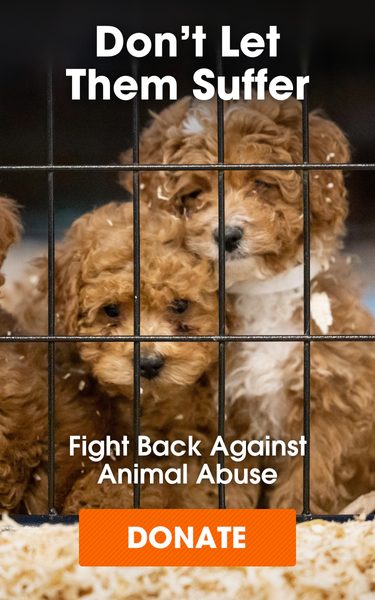Submitted by Connie T., Prattsburgh, NY

Chance’s original name was USDA-GSD-Male #32-A-0506. He was born in a cruel commercial breeding facility located in Montgomery County, Indiana, soon separated from his mother and loaded into a panel van. The van was packed with 103 other puppies on their way to be delivered to pet stores on the East Coast.
On January 24, 2017, Chance’s transport van careened into a ditch and overturned in the town of Avoca, New York. A towing company and several state troopers rescued the puppies and transported them to a safe location.
Miraculously most of the puppies, though likely frightened, were physically unharmed. However, Chance’s crate had been crushed in the accident and his head was badly injured. He was triaged as needing immediate medical care, wrapped in warm towels and quickly driven to the local veterinary hospital.
Chance was diagnosed with a broken jaw, a crushed right nasal passage, crooked eyes and significant blood loss. The vet stabilized him with IV fluids and pain medications, and later performed jaw surgery to wire Chance’s chin back together.
I met Chance in the hospital two days after the accident. Although I am constantly surrounded by dogs due to my work as an obedience instructor and a puppy-raiser for Guiding Eyes for the Blind, Chance’s predicament broke my heart. He was still suffering major injuries. He also couldn’t walk very well—perhaps because he had never been out of a cage—and was unaccustomed to the comfort of a human touch. I decided to adopt him that day.

The next few days were a struggle. Chance wasn’t eating and his bloodwork results were far from promising. But after I visited him, encouraged him to fight harder, and held him in my arms for hours in the recovery room, he started to make progress. The next week he was stable enough to be taken home.
Chance continued to recover and seemed to finally be in the clear—but a few months later, I noticed that he wasn’t growing. I took him back to the vet, who discovered that Chance’s kidneys were not functioning normally, and that one was growing into his liver. Chance was put on a special diet and monitored, yet the problems persisted. After further bloodwork, he was diagnosed with Pituitary Dwarfism.
Chance remains the size of a very large Beagle. He will be on growth hormone treatments every six weeks for the rest of his life—which most likely will not be longer than five years. Chance’s littermates could also have the same condition or pass it on. The vet told me that this death sentence could have easily been avoided if the facility had conducted any genetic testing before breeding Chance’s parents.

Puppy mill operators care more about profits than puppies. They often do nothing to uphold the health and integrity of the breed, and usually couldn’t care less if their unethical techniques lead to the inevitable suffering of dogs or heartbreak of families. Responsible breeders do not sell their puppies to pet stores.
All dogs deserve the good life—but as long as the secretive puppy-breeding industry continues to hide the truth, too many dogs will remain victims of its cruelty. Visit aspca.org/barredfromlove to find out how you can make a difference and stand up for puppies like Chance.

